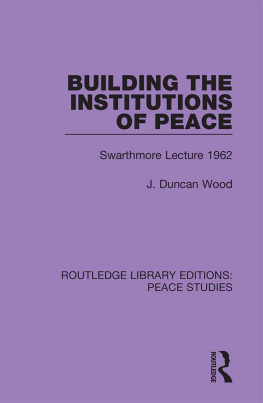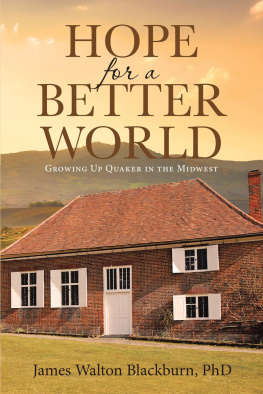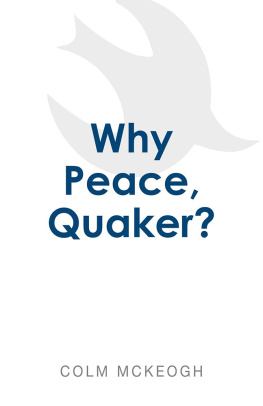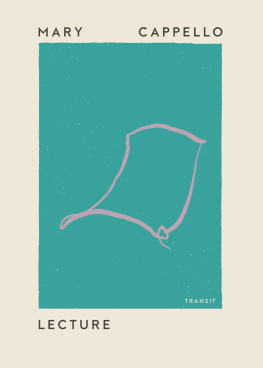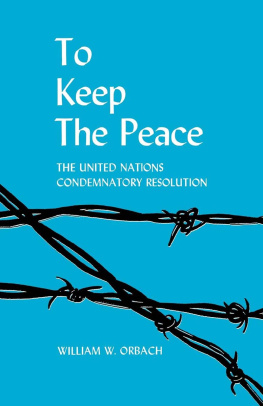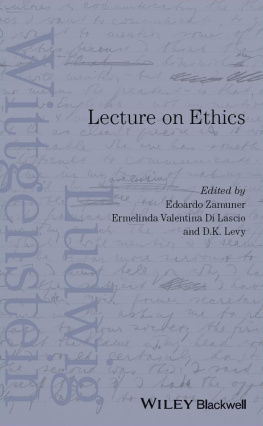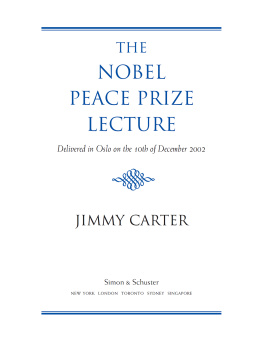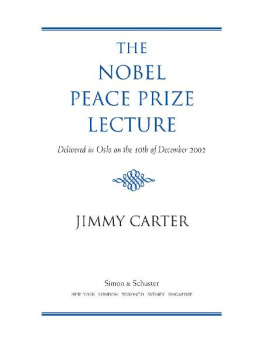ROUTLEDGE LIBRARY EDITIONS:
PEACE STUDIES
Volume 12
BUILDING THE INSTITUTIONS OF PEACE
BUILDING THE INSTITUTIONS OF PEACE
Swarthmore Lecture 1962
J. DUNCAN WOOD
First published in 1962 by George Allen & Unwin Ltd
This edition first published in 2020
by Routledge
2 Park Square, Milton Park, Abingdon, Oxon OX14 4RN
and by Routledge
52 Vanderbilt Avenue, New York, NY 10017
Routledge is an imprint of the Taylor & Francis Group, an informa business
1962 Woodbrooke Council
All rights reserved. No part of this book may be reprinted or reproduced or utilised in any form or by any electronic, mechanical, or other means, now known or hereafter invented, including photocopying and recording, or in any information storage or retrieval system, without permission in writing from the publishers.
Trademark notice: Product or corporate names may be trademarks or registered trademarks, and are used only for identification and explanation without intent to infringe.
British Library Cataloguing in Publication Data
A catalogue record for this book is available from the British Library
ISBN: 978-0-367-21777-8 (Set)
ISBN: 978-0-429-29830-1 (Set) (ebk)
ISBN: 978-0-367-24377-7 (Volume 12) (hbk)
ISBN: 978-0-429-28219-5 (Volume 12) (ebk)
Publishers Note
The publisher has gone to great lengths to ensure the quality of this reprint but points out that some imperfections in the original copies may be apparent.
Disclaimer
The publisher has made every effort to trace copyright holders and would welcome correspondence from those they have been unable to trace.
SWARTHMORE LECTURE 1962
THE SWARTHMORE LECTURES
1940. THE LIGHT OF CHRIST IN A PAGAN WORLD
by John A. Hughes
1941. THE UNDIVIDED MIND
by E. B. Castle
1942. THE LAW OF LIBERTY
by Margaret M. Harvey
1943. PLANNING FOR FREEDOM
by Leyton Richards
1944. MAN, SOCIETY AND RELIGION: AN ESSAY IN BRIDGE-BUILDING
by W. Russell Brain
1945. WORSHIP AND SOCIAL PROGRESS
by Wilfred Allott
1946. THE WARRANT FOR YOUTHS SEARCH
by John Hoare
1947. THE SALT AND THE LEAVEN
by John W. Harvey
1949. AUTHORITY, LEADERSHIP AND CONCERN
by Roger C. Wilson
1950. JUSTICE AND THE LAW OF LOVE
by Konrad Braun
1951. QUAKERISM : A FAITH FOR ORDINARY MEN
by R. Duncan Fairn
1952. PREPARATION FOR WORSHIP
by Thomas F. Green
1953. REMOVING THE CAUSES OF WAR
by Kathleen Lonsdale
1954. FROM LONELINESS TO FELLOWSHIP
by Wilhelm Aarek
1955. WHERE WORDS COME FROM
by Douglas V. Steere
1956. QUAKERS AND THE RELIGIOUS QUEST
by Edgar G. Dunstan
1957. QUAKERISM AND EARLY CHRISTIANITY
by Henry J. Cadbury
1958. THE CONCRETE AND THE UNIVERSAL
by Margaret B. Hobling
1959. THE CASTLE AND THE FIELD
by Harold Loukes
1960. THE CREATIVE IMAGINATION
by Kenneth C. Barnes
1961. TOLERANCE AND THE INTOLERABLE
by Richard K. Ullmann
SWARTHMORE LECTURE 1962
BUILDING THE INSTITUTIONS OF PEACE
BY
J. DUNCAN WOOD
FIRST PUBLISHED IN 1962
This book is copyright under the Berne Convsntion. Apart from any fair dealing for the purpose of private study, research, criticism or review, as permitted under the Copyright Act, 1956, no portion may be reproduced by any process without written permission. Enquiries should be addressed to the Secretary, Swarthmore Lecture Committee, c/o Friends Home Service Committee, Friends House, Euston Road, London, N.W.1
Woodbrooke Council 1962
PRINTED IN GREAT BRITAIN
in 11 on 12 point Baskerville type
BY HEADLEY BROTHERS LTD
109 KINGSWAY LONDON WC2
AND ASHFORD KENT
PREFACE
The Swarthmore Lectureship was established by the Woodbrooke Extension Committee at a meeting held December 7th, 1907; the minute of the Committee providing for an annual lecture on some subject relating to the message and work of the Society of Friends. The name Swarthmore was chosen in memory of the home of Margaret Fox, which was always open to the earnest seeker after Truth, and from which loving words of sympathy and substantial material help were sent to fellow- workers.
The Lectureship has a twofold purpose; first, to interpret further to the members of the Society of Friends their Message and Mission; and, secondly, to bring before the public the spirit, the aims and the fundamental principles of the Friends. The Lecturer alone is responsible for any opinions expressed.
The Lectures have usually been delivered at the time of the assembly of London Yearly Meeting of the Society of Friends. The present Lecture, in abridged form, was delivered at Friends House, Euston Road, on the evening of May 25th, 1962.
A list of previous Lectures, as published in book form since 1940, will be found at the beginning of this volume, and those prior to 1940 at the end.
BIOGRAPHICAL NOTE
THOUGH not born a member of the Society of Friends, J. Duncan Wood was bred a Quaker and cherishes among his earliest memories a childs impression of Woodbrooke where his parents were Wardens. This was during the First World War, a time when even a small boy could appreciate the contrast between the patient promotion of peace within the Woodbrooke precincts and the furious pursuit of war without. He has since spent the greater part of his life within the precincts of Quaker institutions. Educated at Quaker schools, to which he owes among other debts his passion for bird-watching, he returned after graduating from Oxford University to teach at Leighton Park. His career as a schoolmaster was interrupted by wartime service with the Friends Ambulance Unit, three years of which were spent in China. Since 1952 he has been working at Geneva on the frontier where Quaker concerns meet those of an international world which, though employing different means, works for ends to which the Society of Friends is dedicated.
CONTENTS
A QUAKER teacher of history remarked recently that he found it exhilarating to discuss world affairs with his senior pupils at a time when, as never before, we seem poised on the brink of eternity. Such joyful acceptance of being matched with the hour is as commendable as it is rare. Most of us tend to respond to humanitys present predicament with anxiety, frustration, indifference or apathyanything but exhilaration. We feel that we have been matched with an hour more dreadful than any yet recorded and, though it is largely of our own creation, beg the Lord to take it away. But many generations have felt just the same, and we should not add to our anxieties by imagining ourselves to be unique. It is therefore helpful to remind ourselves of a very early crisis and consider what happened to the prophet Elijah when he found himself face to face with the powerful opposition of Jezebel and was forced to flee for his life to a cave on Horeb, the mount of God:

